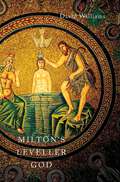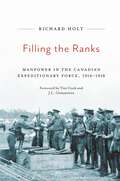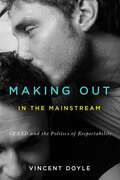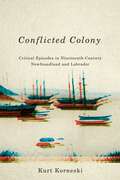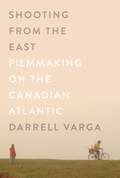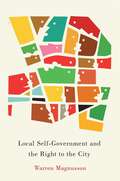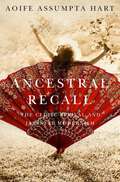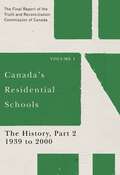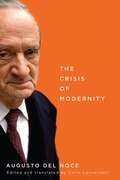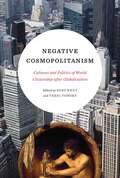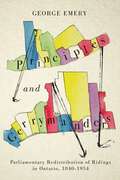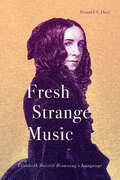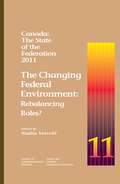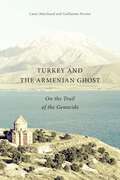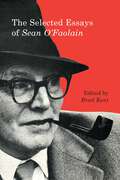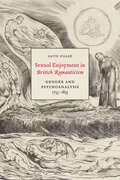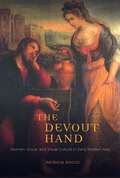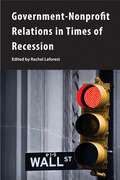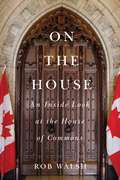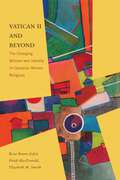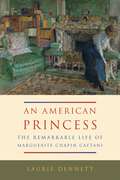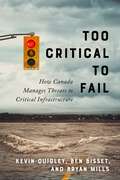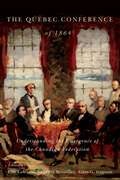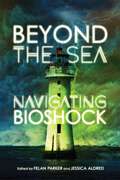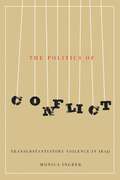- Table View
- List View
Milton's Leveller God
by David WilliamsDavid Williams advances a progressive and democratic interpretation of Milton's epics to show they are more relevant than ever. He traces echoes between Milton's texts and Leveller writings that advocated for popular rule, extended suffrage, and religious tolerance, arguing that Milton's God is still the unacknowledged ground of popular sovereignty.
Filling the Ranks: Manpower in the Canadian Expeditionary Force, 1914-1918 (Carleton Library Series)
by Richard HoltA groundbreaking work on the management of Canadian manpower in the First World War.
Making Out in the Mainstream: GLAAD and the Politics of Respectability
by Vincent DoyleA behind-the-scenes look at the challenges of LGBT media activism during a period of rapid societal change.
Conflicted Colony: Critical Episodes in Nineteenth-Century Newfoundland and Labrador
by Kurt KorneskiA study of borderlands and state formation in nineteenth-century Newfoundland.
Shooting from the East: Filmmaking on the Canadian Atlantic
by Darrell VargaA critical history of filmmaking in Atlantic Canada from the early days of art cinema to the contemporary media industry.
Local Self-Government and the Right to the City (McGill-Queen's Studies in Urban Governance #1)
by Warren MagnussonA timely exploration of the untapped potential for local democracy.
Ancestral Recall: The Celtic Revival and Japanese Modernism
by Aoife HartA comparative modernist study of the connections between Irish and Japanese literature, opening up uncharted avenues of cross-cultural exchange.
Canada’s Residential Schools: The Final Report of the Truth and Reconciliation Commission of Canada, Volume 1 (McGill-Queen's Indigenous and Northern Studies)
by Truth and Reconciliation Commission of CanadaBetween 1867 and 2000, the Canadian government sent over 150,000 Aboriginal children to residential schools across the country. Government officials and missionaries agreed that in order to “civilize and Christianize” Aboriginal children, it was necessary to separate them from their parents and their home communities. For children, life in these schools was lonely and alien. Discipline was harsh, and daily life was highly regimented. Aboriginal languages and cultures were denigrated and suppressed. Education and technical training too often gave way to the drudgery of doing the chores necessary to make the schools self-sustaining. Child neglect was institutionalized, and the lack of supervision created situations where students were prey to sexual and physical abusers. Legal action by the schools’ former students led to the creation of the Truth and Reconciliation Commission of Canada in 2008. The product of over six years of research, the Commission’s final report outlines the history and legacy of the schools, and charts a pathway towards reconciliation. Canada’s Residential Schools: The History, Part 2, 1939 to 2000 carries the story of the residential school system from the end of the Great Depression to the closing of the last remaining schools in the late 1990s. It demonstrates that the underfunding and unsafe living conditions that characterized the early history of the schools continued into an era of unprecedented growth and prosperity for most Canadians. A miserly funding formula meant that into the late 1950s school meals fell short of the Canada Food Rules. Overcrowding, poor sanitation, and a failure to adhere to fire safety rules were common problems throughout this period. While government officials had come to view the schools as costly and inefficient, the churches were reluctant to countenance their closure. It was not until the late 1960s that the federal government finally wrested control of the system away from the churches. Government plans to turn First Nations education over to the provinces met with opposition from Aboriginal organizations that were seeking “Indian Control of Indian Education.” Following parent-led occupation of a school in Alberta, many of the remaining schools came under Aboriginal administration. The closing of the schools coincided with a growing number of convictions of former staff members on charges of sexually abusing students. These trials revealed the degree to which sexual abuse at the schools had been covered up in the past. Former students, who came to refer to themselves as Survivors, established regional and national organizations and provided much of the leadership for the campaign that led to the federal government issuing in 2008 an apology to the former students and their families.
The Crisis of Modernity (McGill-Queen's Studies in the History of Ideas #107)
by Carlo Lancellotti Augusto Del NoceA selection of essays on modernity and secularization by one of the most distinguished Italian thinkers of the mid-twentieth century.
Negative Cosmopolitanism: Cultures and Politics of World Citizenship after Globalization
by Eddy Kent and Terri TomskyA multi-disciplinary approach to cosmopolitanism that explores its negative effects, including how subjects under globalization become cosmopolitan against their will.
Principles and Gerrymanders: Parliamentary Redistribution of Ridings in Ontario, 1840-1954
by George EmeryA window on partisan corruption by majority parties in the redistribution of ridings in Ontario.
Fresh Strange Music: Elizabeth Barrett Browning's Language
by Donald HairA new approach to Elizabeth Barrett Browning's art through the music of her poetry and its social and political implications.
Canada: The Changing Federal Environment: Rebalancing Roles (The State of the Federation #306)
by Nadia VerrelliIn this edition of Canada: State of the Federation, contributors consider whether and to what degree the relationship between the central government and the provincial and territorial governments has changed in the past decade. The authors address three overarching questions. First, is the power base changing in Canada? If so, how are governments responding? Second, what are the implications of the changing environment for the relationships between governments? And third, are there underlying forces – such as economic or technological change, or demands for citizen engagement – that are pushing some provinces and regions to become more assertive in the global environment? The papers are organized into four categories: those that identify and analyze the changing federal environment; those concerned with the implications of the 2011 federal election; those that deal with health policy and economic federalism; and those that explore the growing importance of the North and the changing dynamics among the provinces and the federal government. Among the topics discussed are the impact of a majority government based on a West-Ontario coalition, with Quebec represented primarily by the Opposition, the implications of the trade-off between health care spending and the public financing of other essential public goods, and second-generation trade agreements, such as the Canada-European Union Comprehensive Trade Agreement.
Turkey and the Armenian Ghost: On the Trail of the Genocide
by Laure Marchand Guillaume Perrier Debbie BlytheA compelling portrait of the aftermath of the Armenian genocide and the enduring struggle to have it officially recognized.
The Selected Essays of Sean O'Faolain
by Brad KentThe first collection of essays by one of the most important public intellectuals in Ireland.
Sexual Enjoyment in British Romanticism: Gender and Psychoanalysis, 1753-1835
by David SiglerHow British Romantic writers reimagined sexual enjoyment and invented psychoanalysis in the process.
The Devout Hand: Women, Virtue, and Visual Culture in Early Modern Italy
by Patricia RoccoExploring the role of women artists in creating visual imagery during the Renaissance.
Government-Nonprofit Relations in Times of Recession (Queen's Policy Studies Series #173)
by Rachel LaforestAn exhaustive study of changing nonprofit policy issues in response to the economic recession.
On the House: An Inside Look at the House of Commons
by Rob WalshA former House of Commons official&’s personal account – a learning experience that will surprise.
Vatican II and Beyond: The Changing Mission and Identity of Canadian Women Religious
by Rosa Bruno-Jofré Heidi MacDonald Elizabeth SmythA look at the impact of Vatican II through the Canadian Religious Conference and the lived experience of Sisters Alice Trudeau and Mary Alban.
An American Princess: The Remarkable Life of Marguerite Chapin Caetani
by Laurie DennettHow a New Englander became a princess, made literary history, and helped create Italy&’s most romantic garden.
Too Critical to Fail: How Canada Manages Threats to Critical Infrastructure
by Bryan Mills Kevin Quigley Ben BissetHow markets, media, and private interests shape government responses to natural disasters, pandemics, industrial failures, cyber-attacks, and terrorist threats.
The Quebec Conference of 1864: Understanding the Emergence of the Canadian Federation
by Eugénie Brouillet, Alain-G. Gagnon, and Guy LaforestA new interpretation of a key period in Canadian political history.
Beyond the Sea: Navigating Bioshock
by Felan Parker and Jessica AldredA collection of innovative essays on the iconic, dystopian video game series and its lasting influence.
The Politics of Conflict: Transubstantiatory Violence in Iraq
by Monica IngberA new look at the politics and legitimation of violence.
